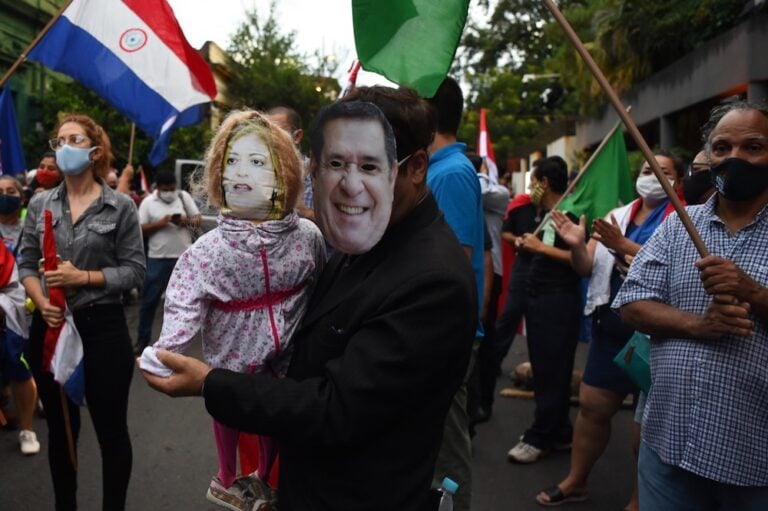An attempt to censor TV Pública immediately after the Senate vote removing Lugo and the suspension of certain opinion programmes have sparked RSF's concern about freedom of information.
UPDATE: Community radio stations face crackdown for “inciting crime” (RSF, 14 August 2012)
(RSF/IFEX) – 26 June 2012 – Some are calling it a coup. President Fernando Lugo’s hasty impeachment and removal on 22 June is raising many concerns including concern about freedom of information. An organization like Reporters Without Borders that defends media freedom has every right to be alarmed, as the country’s democracy seems to have been shaken and undermined.
An attempt to censor TV Pública immediately after the senate vote removing Lugo and the suspension of certain opinion programmes have reinforced our concern.
“The Honduran precedent, which we have repeatedly condemned, justifies our vigilance although it was much more violent,” Reporters Without Borders said. “News coverage – and often its control – is crucial in a political crisis such as this. The new, legal government cannot hope to restrict the public debate in order to conceal the justified criticism of Lugo’s ouster just nine months before the next presidential election, in which he did not intend to be a candidate.
“Even the Inter-American Commission on Human Rights has criticized the lack of fairness and transparency in Lugo’s removal . Such a debate should not be subject to any restriction, especially in the country’s leading media, which must act as vehicles of real pluralism. The Paraguayan public has a right to know the truth.”
In Lugo’s impeachment by parliament, the sentence was decided in advance and was quickly executed, and there was little respect for the right of defence. There was no judicial investigation into the events cited as grounds for his impeachment – clashes on 15 June in the eastern district of Curuguaty (near the Brazilian border) in which 11 peasant farmers demanding land and six policemen were killed.
Although legally possible under article 225 of the constitution, Lugo’s removal has all the ingredients for a major controversy.
The controversy grew on the evening of 22 June, when the new government’s communications director, Cristián Vázquez, turned up at TV Pública. “He demanded outright that the station stop broadcasting its programmes,” Reporters Without Borders was told by Andrés Colman of the daily Última Hora, who heads the Paraguayan Journalists’ Forum (FOPEP).
“He even said he came on behalf of the new president, Federico Franco, which alarmed us. It was clear that the new authorities were being panicked by TV Pública’s broadcasting of expressions of support for Fernando Lugo and by its Micrófono Abierto (Open Microphone) programme, in which the public speaks on the air.”
A debate on public television’s role took place within TV Pública 24 hours later. Launched in August 2011 under the Lugo presidency, TV Pública is the first public service television station of its kind in Paraguay and everyone we talked to acknowledged that it had developed an independent and pluralistic editorial line.
“Its director, Marcelo Martinessi, who has just resigned because of the events, like other senior members of its staff, had managed to develop a neutral or sometimes critical approach towards the Lugo administration,” said Maria Clara Mernes of the Centre for Development Information and Resources, a civil society organization. She attributed Vazquez’s visit to “tactlessness at a time of turmoil and confusion” but Colman insisted that it was a censorship attempt. Subsequent events proved him right.
“The new authorities saw the public’s reaction growing in strength,” Colman said. “During the debate in which I was participating on 23 June, the TV station’s employees began to occupy the premises. The event triggered protests. At the end of the day, the station’s signal was cut for 25 minutes. The National Electricity Administration (ANDE) later claimed that it was due to a mistake.”
The day before, Radio Nacional’s weekly programme Ápe ha pepe (Here and there in Guaraní language) was also cut short. “We will see if it is back on the air next Saturday,” said a Paraguayan expatriate who often participates in the programme.
Officially, Radio Nacional director Judith Maria Vera is still in her post and does not intend to change the station’s programming. In a public statement, she said she had received no orders to this effect. TV Pública, on other hand, no longer has anyone in command and the police tried to evacuate the building yesterday.
Lugo’s removal has already caused a split in the media. “The main privately-owned media, and many of their journalists, have in general defended his impeachment, either openly or by playing it down and by not telling the whole story,” said an independent journalist based in Ciudad del Este.
“But the community radio stations are taking a different line, they are condemning the “parliamentary coup’,” he added. “A lot of the information about the removal process is now coming out via the Internet and social networks.” There is a danger that online insults and abuse will exacerbate the polarization already under way.


